
Whether you are in prison or not –
In this country it doesn’t matter.
You always feel that you are not free.
(© Ihar Bancar, musician, performer)
In 2019, PEN Belarus began systematically collecting data on the violation of the human and cultural rights of cultural workers in the country. In January 2021, as the socio-political crisis intensified, we presented a public report of our monitoring results entitled “Belarus 2020: without the right to culture”.
In 2021 the crisis in Belarus continued and culture remained the focus of our monitoring. The level of repression faced by cultural workers has not decreased since 2020. Among the current political prisoners in Belarus 68 are cultural workers. Our colleagues are either in prison after being sentenced or awaiting sentencing. Many cultural workers have been forced to flee the country for their own security. Civil society organizations have been affected by the crackdown: all human rights defending organizations as well as many nongovernmental cultural and educational organizations have been liquidated. Mass firing of staff from state cultural institutions in retaliation for dissent, censorship, and prohibitions characterize year 2021.
This report contains statistics and analysis of the violations that took place in 2021. We prepared it using public information collected from open sources as well as direct communication with cultural workers and representatives of cultural institutions throughout the year.
I. MAIN RESULTS
We recorded 1,455 violations of the cultural rights and human rights of cultural figures in 2021. We collected information on the repression of 628 cultural figures, more than 240 organizations and associations, as well as on questions of cultural heritage and discriminatory policy regarding the Belarusian language.
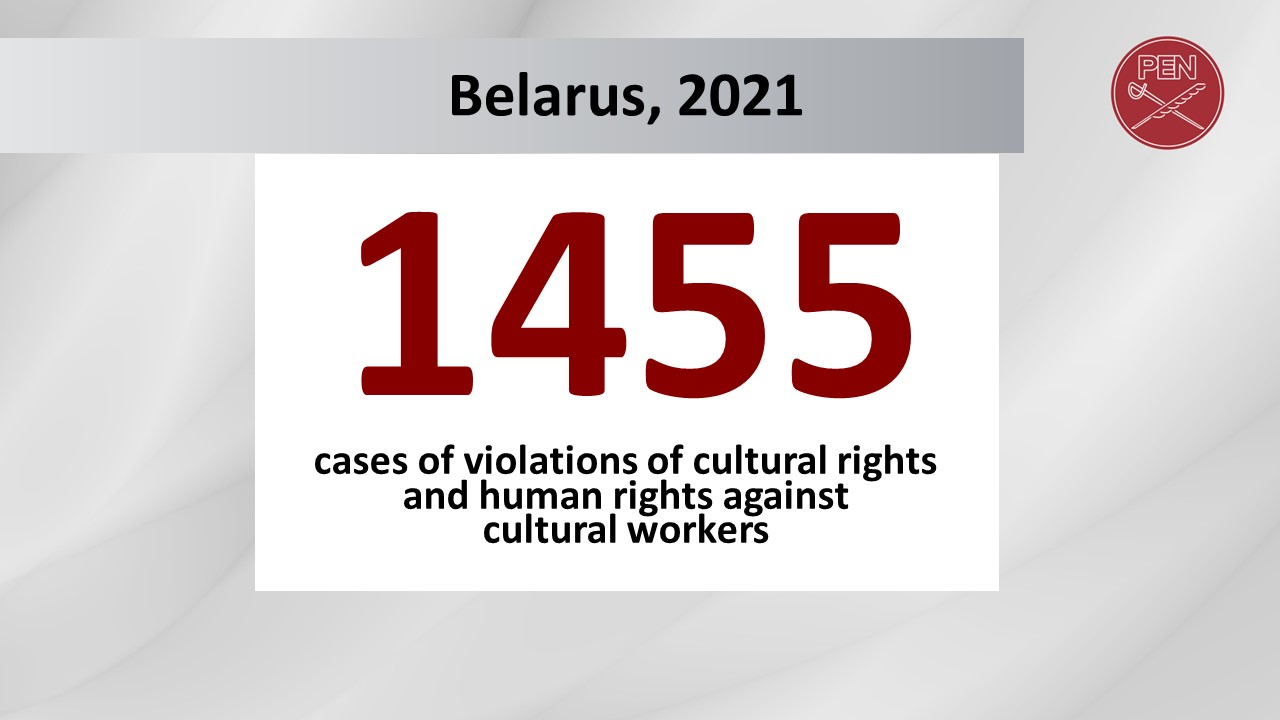
In 2021 the Belarusian authorities launched a fight against culture, civil society, and dissent with a scope that contrary to expectations turned out to be more severe than critical events we described in our monitoring “Belarus 2020: without the right to culture”.
The dynamics of violations per quarter from 2020–2021 can be seen in the graph below:

The number of violations recorded in 2021 is 2.5 times higher than the number recorded in 2020: 1,455 vs 593 respectively.
CULTURAL WORKERS WHO ARE POLITICAL PRISONERS
As of December 31.2021, there are 969 political (the procedure for recognition as a political prisoner is set forth in a certain framework document) prisoners in Belarus. 68 of these are cultural figures:
- architect Arciom Takarčuk – 11.20.2020 sentenced to 3.5 years in a penal colony;
- artist Uladzislaŭ Makaviecki – 12.16.2020 sentenced to 2 years in a penal colony;
- poet and programmer Anatol Chinievič – 12.24.2020 sentenced to 2.5 years in a penal colony;
- concert agency director Ivan Kaniavieha – 02.04.2021 sentenced to 3 years in a penal colony;
- artist Alaksandr Nurdzinaŭ – 02.05.2021 sentenced to 4 years in a strict-regime penal colony;
- documentary film author and blogger Paviel Spiryn – 02.05.2021 sentenced to 4.5 years in a penal colony;
- poet and director Ihnat Sidorčyk – 02.16.2021 sentenced to 3 years in an open-type correctional institution [OTCI]. He has been serving this sentence since 06.14.2021;
- writer and journalist Kaciaryna Andrejeva (Bachvalava) – 02.18.2021 sentenced to 2 years in a penal colony;
- cultural manager Lavon Chalatran – 02.19.2021 sentenced to 2 years in OTCI. He has been serving the sentence since 06.13.2021;
- designer Maksim Taćcianok – 02.26.2021 sentenced to 3 years in OTCI. He has been serving the sentence since 06.18.2021;
- artist and animator Ivan Viarbicki – 03.15.2021 sentenced to 8 years and 1 month in a strict-regime penal colony;
- UX/UI-designer Dźmitryj Kubaraŭ – 03.24.2021 sentenced to 7 years in a strict-regime penal colony;
- artist, former student of the Academy of Sciences Anastasija Mironcava – 04.01.2021 sentenced to 2 years in a penal colony;
- drummer Alaksiej Sančuk – 05.13.2021 sentenced to 6 years in a strict-regime penal colony;
- cultural manager Mia Mitkievič – 05.20.2021 sentenced to 3 years in a penal colony;
- writer and socio-political figure Paviel Sieviaryniec – 05.25.2021 sentenced to 7 years in a strict-regime penal colony;
- poet, founder of the “Medovaya” literary prize Mikalaj Papieka – 06.08.2021 sentenced to 2 years in OTCI. He has been serving the sentence since 09.13.2021;
- dancers Ihar Jarmolaŭ and Mikalaj Sasieŭ – 06.10.2021 sentenced to 5 years in a strict-regime penal colony;
- arts patron Viktar Babaryka – 07.06.2021 sentenced to 14 years in a strict-regime penal colony;
- actor Siarhiej Volkaŭ – 07.06.2021 sentenced to 4 years in a strict-regime penal colony;
- lighting designer Danila Hančaroŭ – 07.09.2021 sentenced to 2 years in a penal colony;
- musician Paviel Larčyk – 07.09.2021 sentenced to 3 years in a penal colony;
- poet and publicist, a former student of the Faculty of Philosophy and Social Sciences at BSU Ksienija Syramalot – 07.16.2021 sentenced to 2.5 years in a penal colony;
- former students of the Faculty of Aesthetic Education in BSPU – Jana Orobiejko i Kasia Buďko 07.16.2021 sentenced to 2.5 years in a penal colony;
- former student at the Academy of Arts Maryja Kalenik – 07.06.2021 sentenced to 2.5 years in a penal colony;
- former student in the Faculty of Architecture at BNTU Viktoryja Hrankoŭskaja – 07.16.2021 sentenced to 2.5 years in a penal colony;
- designer and architect Raścislaŭ Stefanovič – 07.19.2021 sentenced to 8 years in a strict-regime penal colony;
- musician & D.J. Artur Amiraŭ – 08.20.2021 sentenced to 3.5 years in a strict-regime penal colony;
- history and social studies teacher Andrej Piatroŭski – 08.25.2021 sentenced to 1.5 years in a penal colony;
- poet, musician, and advocate Maksim Znak – 09.06.2021 sentenced to 10 years in a strict-regime penal colony;
- musician and cultural project manager Maryja Kaleśnikava – 09.06.2021 sentenced to 11 years in a penal colony;
- musician Jaŭhien Piatroŭ – 09.11.2021 sentenced to 1 year in a penal colony;
- researcher at the Center for Research of Belarusian Culture, Language and Literature of the National Academy of Sciences Alaksandr Halkoŭski – 09.14.2021 sentenced to 1.5 years in OTCI. He has been serving this sentence since 10.16.2021;
- promoter of history and human rights advocate Taćciana Lasica – 11.03.2021 sentenced to 2.5 years in a penal colony;
- author of prison literature, activist of the anarchist movement Mikalaj Dziadok – 11.10.2021 sentenced to 5 years in a penal colony;
- musicians Uladzimir Kalač and Nadzieja Kalač – 12.14.2021 sentenced to 2 years in a penal colony;
- promoter of history, blogger Eduard Palčys – 12.17.2021 sentenced to 13 years in a strict-regime penal colony;
- author of prison literature, activist of the anarchist movement Ihar Alinievič – 12.22.2021 sentenced to 20 years in a strict-regime penal colony;
- musicians Piotr Marčanka, Julija Marčanka (Junickaja) and Anton Šnip – 12.28.2021 sentenced to 1.5 years in a penal colony;
- cultural manager Eduard Babaryka – he has been in pre-trial detention since 06.18.2020;
- manager of cultural projects, author of a book of fairy tales written in captivity, businessman Alaksandr Vasilevič – he has been in pre-trial detention since 08.28.2020;
- activist, reenactor of history Kim Samusienka – he has been in pre-trial detention since 11.03.2020;
- director of documentaries, journalist Ksienija Luckina – she has been in pre-trial detention since 12.22.2020;
- poet, journalist and media manager Andrej Alaksandraŭ – he has been in pre-trial detention since 01.12.2021;
- author of musical projects and director of typography Arciom Fiedasienka – he has been in pre-trial detention since 03.19.2021 (01.14.2022 Arciom Fiedasienka sentenced to 4 years in a penal colony);
- chairwoman of the Union of Poles Anžalika Borys – she has been in remand prison since 03.23.2021;
- poet and member of the Union of Poles Andrej Pačobut – he has been in remand prison since 03.27.2021;
- artist Aleś Puškin – he has been in pre-trial detention since 03.30.2021;
- author and editor, political scientist, and analyst Valeryja Kaściuhava – she has been in pre-trial detention since 06.30.2021;
- writer, musician and author of the magazine “Naša historyja” Andrej Skurko – he has been in pre-trial detention since 07.08.2021;
- writer, researcher on the history of Belarusian literature, essayist and human rights defender Aleś Bialacki – he has been in pre-trial detention since 07.14.2021;
- street-art artist and IT-specialist Dźmitryj Padrez – he has been in pre-trial detention since 07.15.2021;
- philosopher, methodologist, and publicist Uladzimir Mackievič – he has been in pre-trial detention since 08.04.2021;
- sound engineer Kiryl Salejeŭ – he has been in pre-trial detention since 09.14.2021 (01.11.2022 Kiryl Salejeŭ sentenced to 3 years in OTCI);
- former teacher of Belarusian language and literature Ema Stsepulionak – she has been in pre-trial detention since 09.29.2021;
- musician, violin teacher Aksana Kaśpiarovič – she has been in remand prison since 09.30.2021;
- bass guitarist Viktar Katoŭski – he has been in pre-trial detention since 09.30.2021;
- photographer and journalist Hienadź Mažejka – he has been in pre-trial detention since 10.01.2021;
- history teacher Artur Ešbajeŭ – he has been in pre-trial detention since 11.02.2021;
- founder of Symbal.by, manager of cultural projects Paviel Bielavus – he has been in pre-trial detention since 11.15.2021;
- science fiction writer, journalist Siarhiej Sacuk – he has been in pre-trial detention since 12.08.2021;
- author of non-fiction books, journalist Aleh Hruzdzilovič – he has been in pre-trial detention since 12.23.2021;
- literary and cultural critic Julija Čarniaŭskaja – she has been under house arrest since 05.20.2021 (without the possibility of going outside or any communication with the outside world, with the exception of a lawyer) (01.13.2022 Julija Čarniaŭskaja had her measure of restraint changed and released from house arrest, but she remains a defendant in the criminal case).
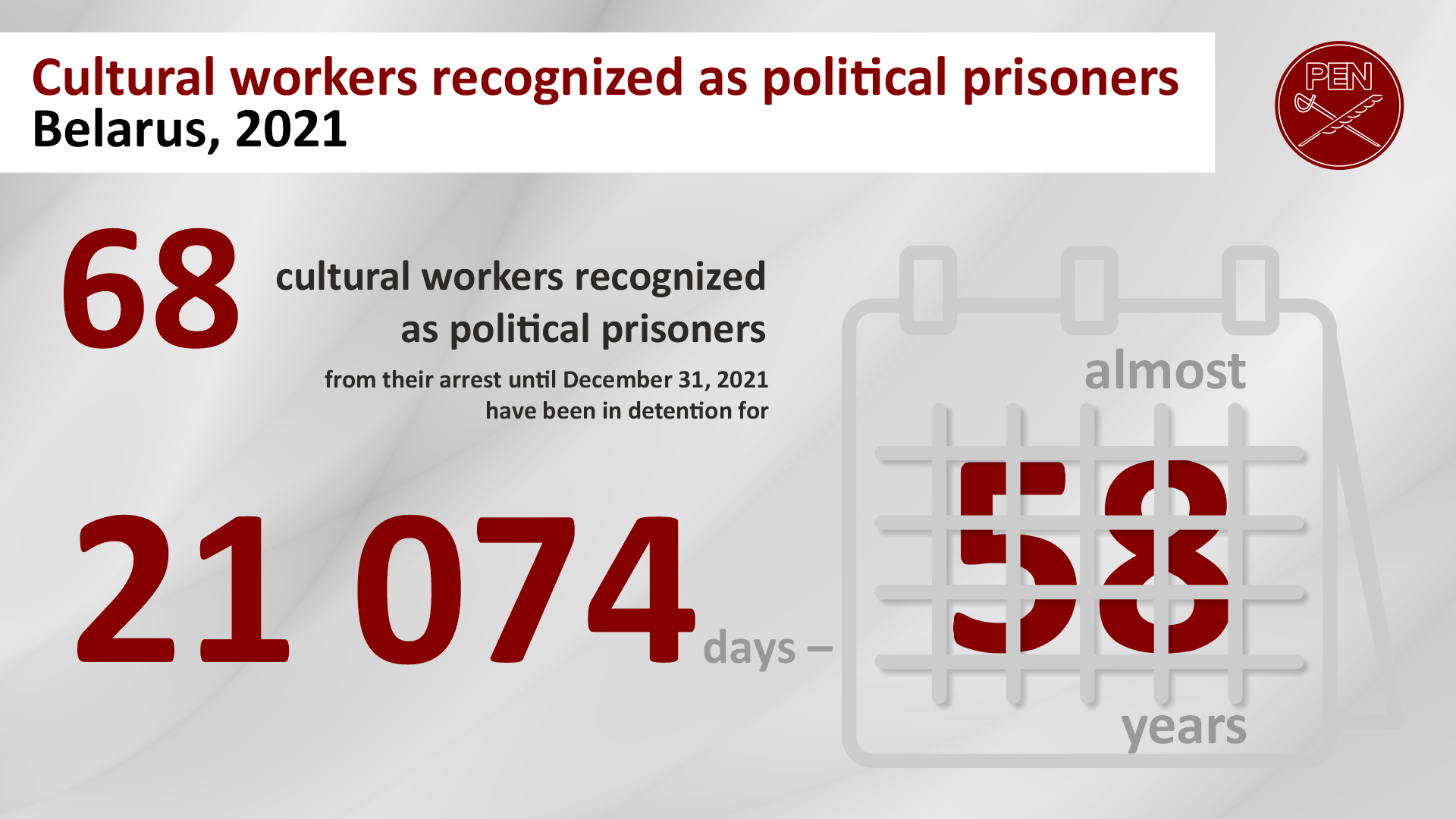
In detention are also the writer, translator, and literary critic Alaksandr Fiaduta, the local historian and activist Uladzimir Hundar, and the cameraman Viačaslaŭ Lamanosaŭ.
RIGHT TO LIFE
Vitold Ašurak, promoter of history and activist from Biarozaŭka, died in the colony in Škłoŭ city on May 21, 2021 in unexplained circumstances. The official reason for his death is a heart attack. His relatives, however, insist that he did not suffer from heart problems. Neither they nor the public have received convincing proof that he died of natural causes.
Anatol Pasieka, an employee of the Janka Kupala Museum in Minsk, died in his workplace on August 5, 2021 during a planned fire safety check.
CONVEYOR OF CRIMINAL CASES
In total, 63 sentences were passed against 62 cultural workers.
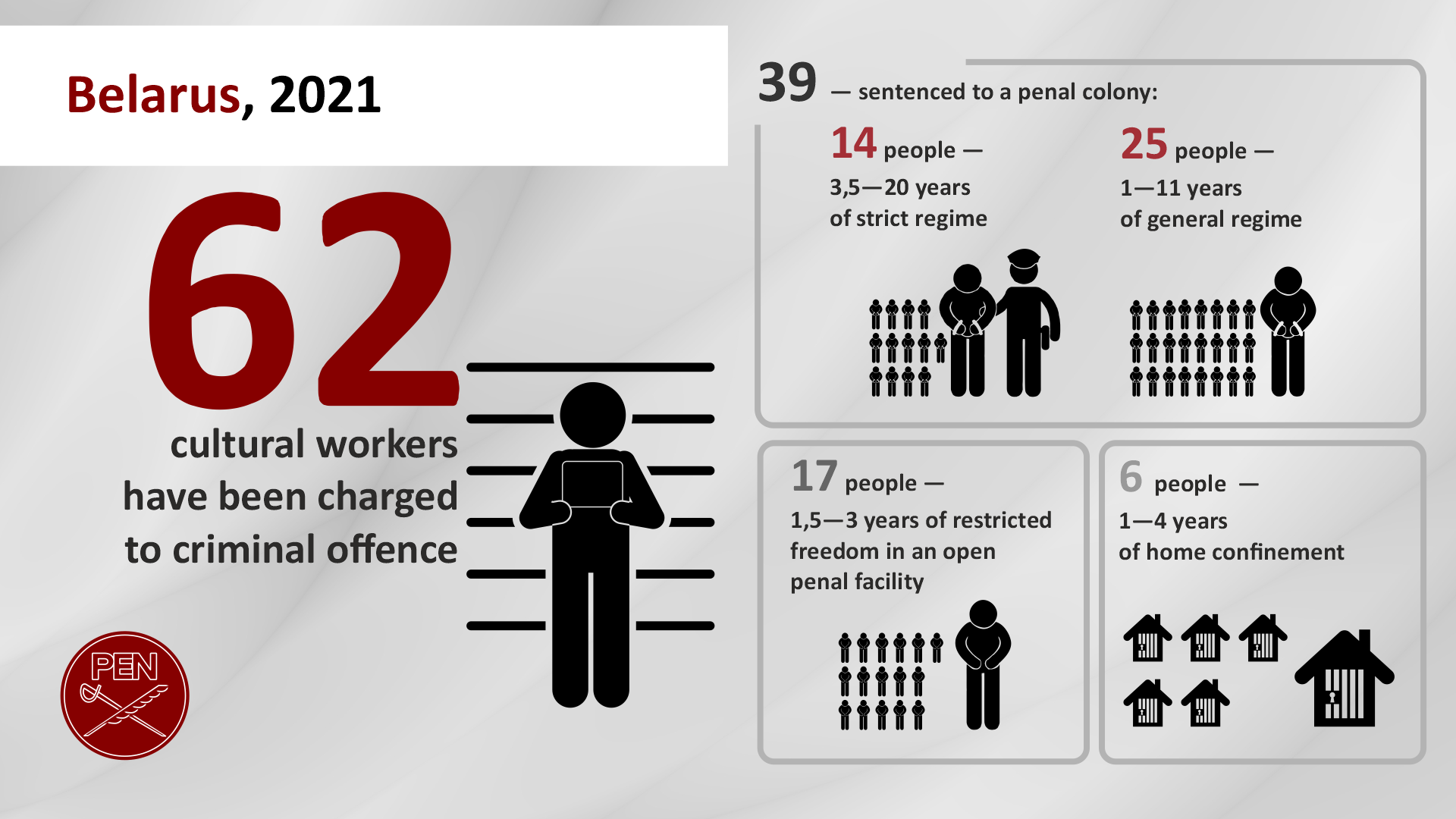
Data on the sentences of individuals who do not fall within the “political prisoner” category:
- cameraman Viačaslaŭ Lamanosaŭ 01.15.2021 sentenced to 2 years in a penal colony;
- architect Vadzim Dźmitronak 03.17.2021 sentenced to 3 years in OTCI;
- translator Volha Kalackaja 03.24.2021 sentenced to 2 years of home confinement (Restriction of liberty without referral to an open-type correctional facility, i.e. the convicted person remains at home but must comply with a number of rules such as going to work and reporting to the police);
- writer and activist Alena Hnaŭk convicted twice: 05.07.2021 sentenced to 2 years of home confinement, 09.03.2021 to 2 more years; in total, considering undone punishment – 3 years of home confinement;
- local historian and activist Uladzimir Hundar 05.20.2021 sentenced to 3 years in a penal colony;
- musician Uladzisłaŭ Navažylaŭ 06.21.2021 sentenced to 3 years in OTCI;
- poet and musician Hanna Važnik 06.28.2021 sentenced to 1 year of home confinement;
- librarian Julija Laptanovič 08.04.2021 sentenced to 3 years of home confinement;
- designer Taćciana Minina 08.12.2021 sentenced to 4 years of home confinement;
- cultural manager Iryna Chvajnickaja 08.20.2021 sentenced to 3 years in OTCI;
- cultural manager Rehina Lavor 09.16.2021 sentenced to 2 years of home confinement.
Analyzing the events of 2021, the following 24 cases should also be highlighted:
- cultural managers Cimur Hazizaŭ (09.20.21 sentenced to 2 years in OTCI) and Jaŭhien Kračkoŭski (11.09.21 sentenced to 3 years in OTCI), writer and teacher of Belarusian language and literature Aleś Minaŭ (11.25.21 sentenced to 3 years in OTCI), and also art-manager Alaksandr Bahdanaŭ and set designer Maksim Kruk (12.17.21 sentenced to 3 years in OTCI) they are at large awaiting a decision on their appeals;
- cultural manager Taćciana Hacura-Javorskaja, translator Andrej Dyńko, poet Siarhiej Sys, an employee of PEN Belarus Volha Rakovič, cultural manager and human rights activist Andrej Paluda, writer Viktar Sazonaŭ, cultural manager Siarhiej Mackievič, writer and journalist Ihar Iljaš, cultural manager Taćciana Vadalažskaja were detained for periods from 1 to 13 days and currently have various restrictions (a travel restrictions, non-disclosure statements, etc investigative actions are being carried out against some of them);
- representatives of the Union of Poles in Belarus Hanna Panišava, Irena Biernackaja and Maryja Ciškoŭskaja were released under the condition of “leaving the territory of the country” – actually deported from Belarus on May 25;
- art-researcher Ala Šarko and cameraman Pietr Slucki were released from jail on 19 August, where they spent 8 months. Sviatlana Kuprejeva, a poet and member of Viktar Babaryka’s initiative group, was released from jail on October 12 after spending 16 months in prison;
- musician Maksim Šaŭlinski (04.23.21 sentenced to 2 years in OTCI) was pardoned and released on September 16;
- cultural manager Dzianis Čykaloŭ (03.22.21 sentenced to 3 years in OTCI) and musician Dźmitryj Šymanski (10.29.21 sentenced to 3 years in OTCI) left the country for security reasons;
- musician Ihar Bancar (03.19.21 sentenced to 1.5 years in OTCI) on December 17 he served his entire sentence by court verdict.
DETENTION CONDITIONS
We have recorded 110 reports of cultural workers being detained in cruel and degrading conditions. “Preserving human dignity is first and foremost preserving basic sanitary and hygienic norms. Life, if you are a politician, becomes a round-the-clock fight to not become an animal” (© Andrej Dyńko).
Detained cultural workers have reported the absence of medical assistance, the failure to provide such assistance in a timely manner, the refusal of access to examination by specialists, the refusal of access to hospitalization, the refusal to provide necessary medications.
Maryja Kaleśnikava’s father was refused the right to visit his daughter 15 times. He was only able to meet with her one year after her imprisonment. Paviel Sieviaryniec was not allowed to leave prison for his father’s funeral. Valeryja Kaściuhava also did not attend her father’s funeral.
Limiting the right to correspondence is an additional means of pressure applied to practically all detained cultural workers. Alaksandr Fiaduta was forced to refuse medication in protest against the restrictions on his correspondence with his relatives.
There is a special system of psychological pressure for political prisoners. Vitold Ašurak wrote from the Škłoŭ penal colony that it was not difficult to identify political prisoners because the prison administration made them wear yellow tags on their trousers. Journalist Ihar Iljaš highlighted that this is a means of segregating prisoners who have a tendency towards “extremism.” Many detained cultural workers were subjected to such “preventative measures.”
Access to books and printed media is denied without basis.
ANALYSIS OF THE CONDITIONS
Statistics regarding rights violations are as follows:
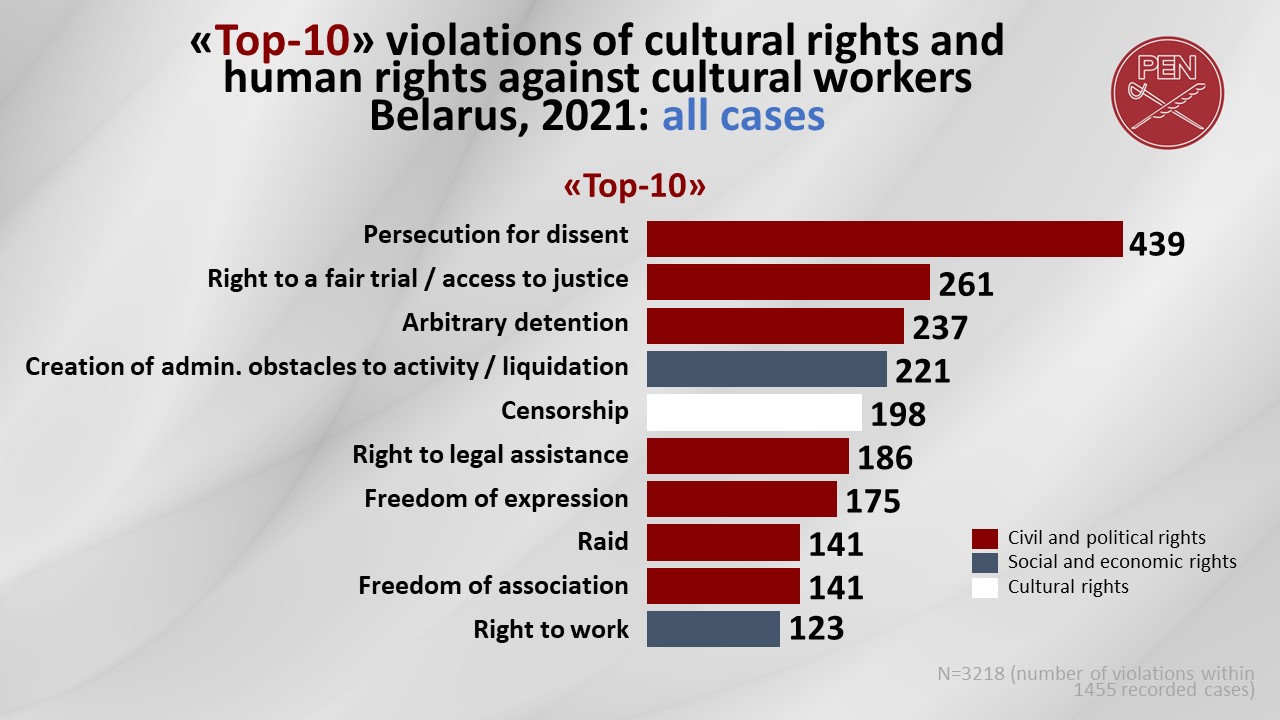
Persecution for dissent, the right to a fair trial, and arbitrary detention were the most common rights violations in Belarus in 2021. Dividing these violations into groups, it is clear that cultural workers most often suffer the violation of civil and political rights. These account for 80 % of recorded violations.
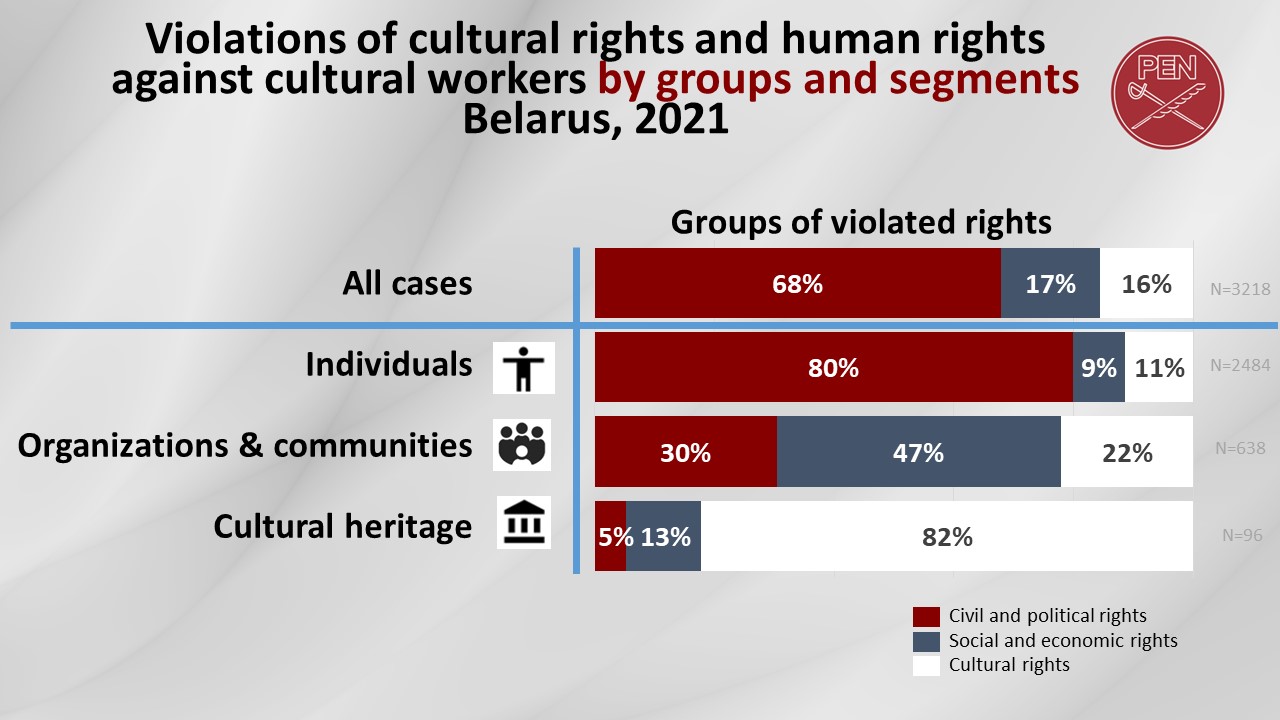
Against the backdrop of the protracted socio-political crisis, civil and political rights have seen the most violations in 2021, just as they did in 2020. Nonetheless, it is worth noting that in 2021, the number of violations of socio-economic and cultural rights has increased significantly.
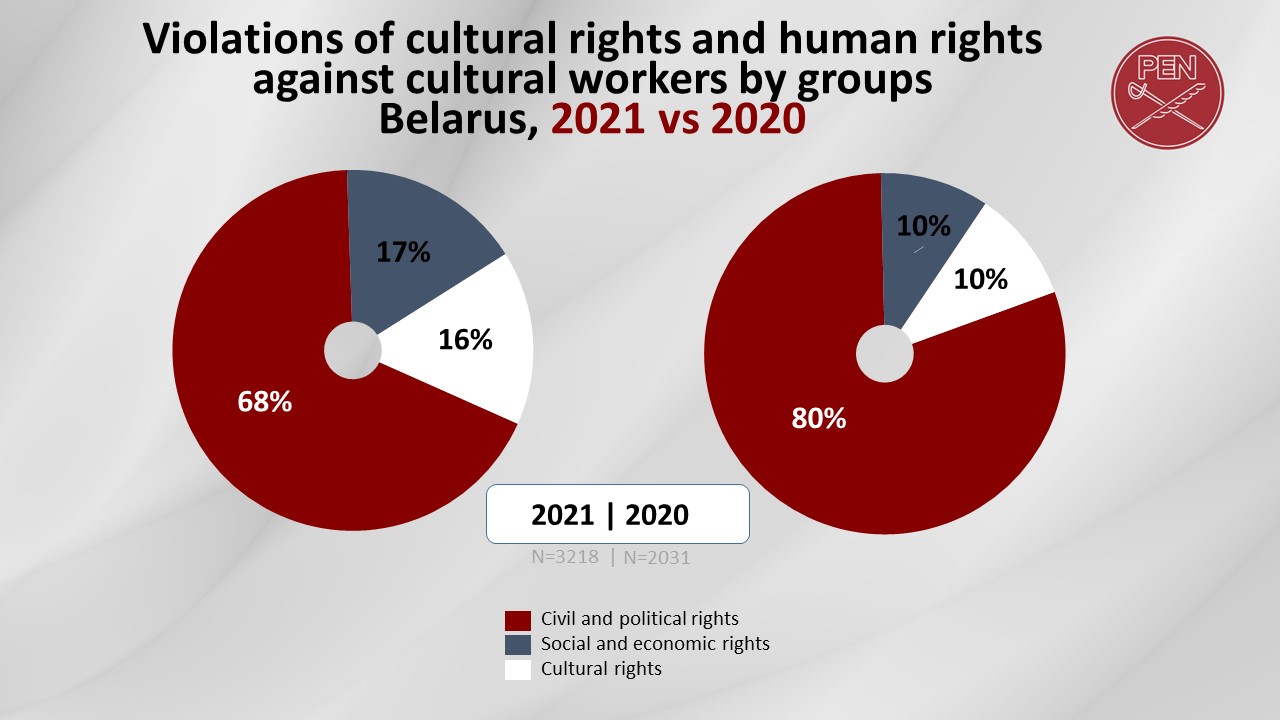
To a large extent, these changes are the result of massive pressure on civil society organizations (creation of administrative obstacles for operation, the liquidation of organizations, the seizing of property) and the tendency towards mass censorship.
II. VIOLATIONS OF THE RIGHTS OF CULTURAL FIGURES
In total, we recorded 1,041 violations of the cultural and human rights of private individuals in 2021. Overall, the rights of 628 cultural workers were violated.
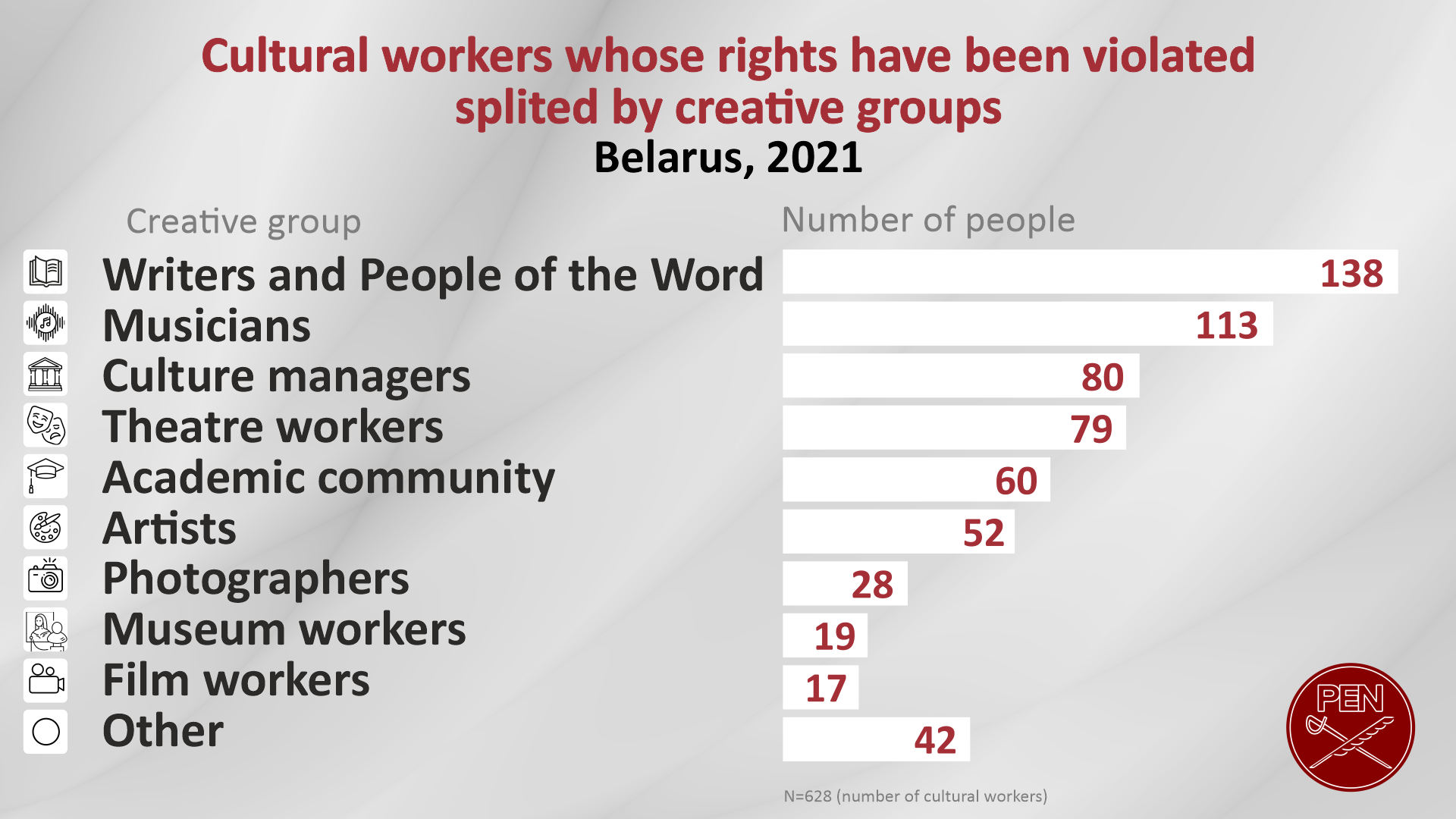
Statistics of the most common types of rights violations can be seen in the graph below:
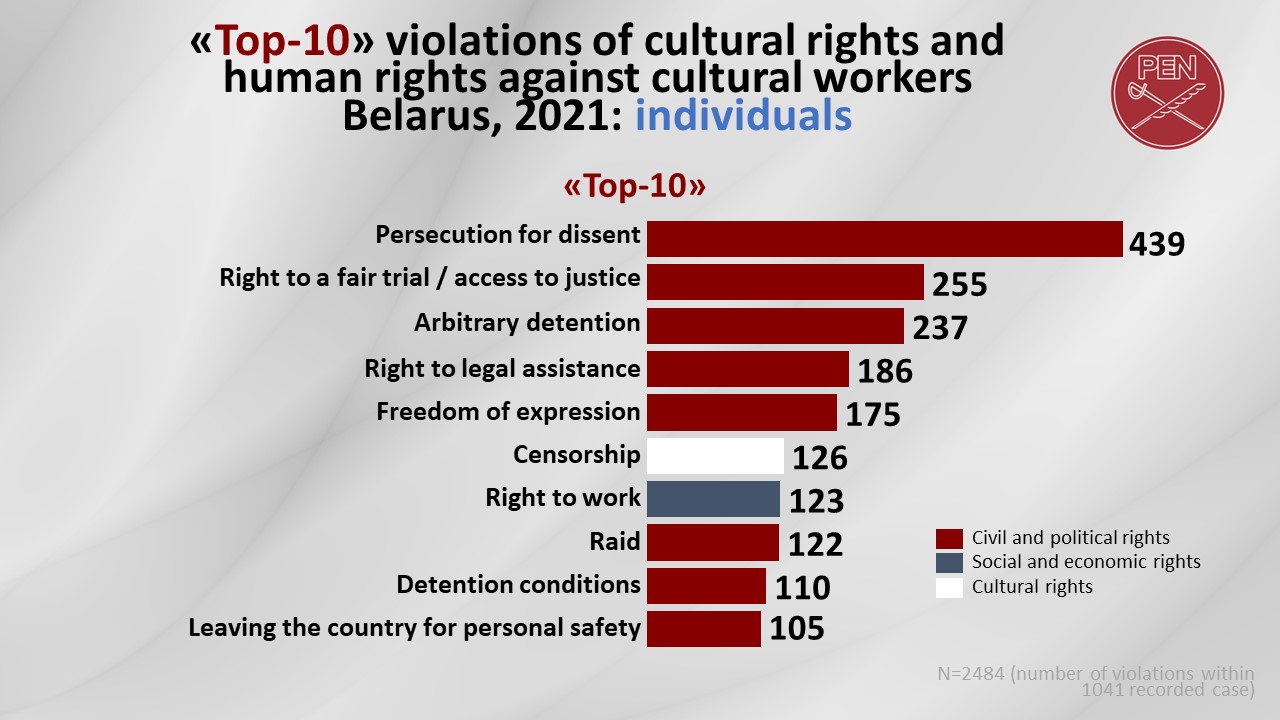
PERSECUTION FOR DISSENT has been the key characteristic of 2021. We recorded 439 instances of this. Among them are the facts of dismissal from cultural institutions for political reasons as well as punishment for acts of solidarity on the anniversary of an artist’s death. Cultural workers have experienced all forms of pressure, from “preventive conversations” and recommendations not to express political opinions on social media, to dismissals, detention, raids, criminal cases, and expulsion from the country.
In 2021, we recorded:
- 237 instances of arbitrary detention,
- 123 illegal dismissals / discontinuation of contract,
- 122 raids,
- 105 exits from the country for personal security,
- 89 instances of persecution through criminal cases,
- 80 instances of property confiscation,
- 3 deportations.
Besides these forms of persecution, we also recorded: interrogations, particularly thorough checks when crossing the border, the freezing of bank accounts, expulsions from educational institutions, removal of honorary titles and awards. The well known theater director and documentary filmmaker Valery Mazynski – who had been an ‘honored artistic worker of the Belarusian Soviet Socialist Republic’, the winner of many prizes, and one of the founders of the state theater “Lyalka” in Viciebsk and the “Free Stage” theater in Minsk, was deprived of his pension for ‘meritorious service pension to the Republic of Belarus’. He had criticized state policy regarding the cultural sphere.
RIGHT TO A FAIR TRIAL / ACCESS TO JUSTICE are the second most common rights that have been violated in the case of cultural workers. They are violated every time a person gets every time a person gets a short-term arrest sentence and fines for expressing political opinions or playing the wrong songs on the guitar. In such trials, there is often no proof, the police records are falsified, and witnesses give false testimony. The right to a fair trial is violated every time that cultural workers are sentenced to months, years, or even decades in prison for their participation in peaceful gatherings, for the public expression of opinions, for helping those who have been repressed so that their example will inspire others. Significant trials take place behind closed doors: without relatives, media, the public, or observers. This was the case in the trials of Viktar Babaryka, Maryja Kaleśnikava, Maksim Znak, Eduard Palčys, Paviel Sieviaryniec, Ihar Bancar, and others.
Authorities suspended the investigation into the death of the artist Raman Bandarenka (November 12, 2020) and completely ignored the results of an independent investigation.
No criminal case was launched as a result of the death of political prisoner Vitold Ašurak in the penal colony.
On December 17, Eduard Babaryka had spent 18 months in detention. On 20 December, the authorities launched another criminal case against him instead of releasing him or taking his case to court.
ARBITRARY DETENTIONS
We recorded a total of 237 arbitrary detentions in 2021. In the majority of cases, the detentions were followed by administrative liability proceedings, administrative arrest, or fines. The days spent by cultural workers in prison become years and the fines they paid, in hundreds of roubles, go into the country’s budget.
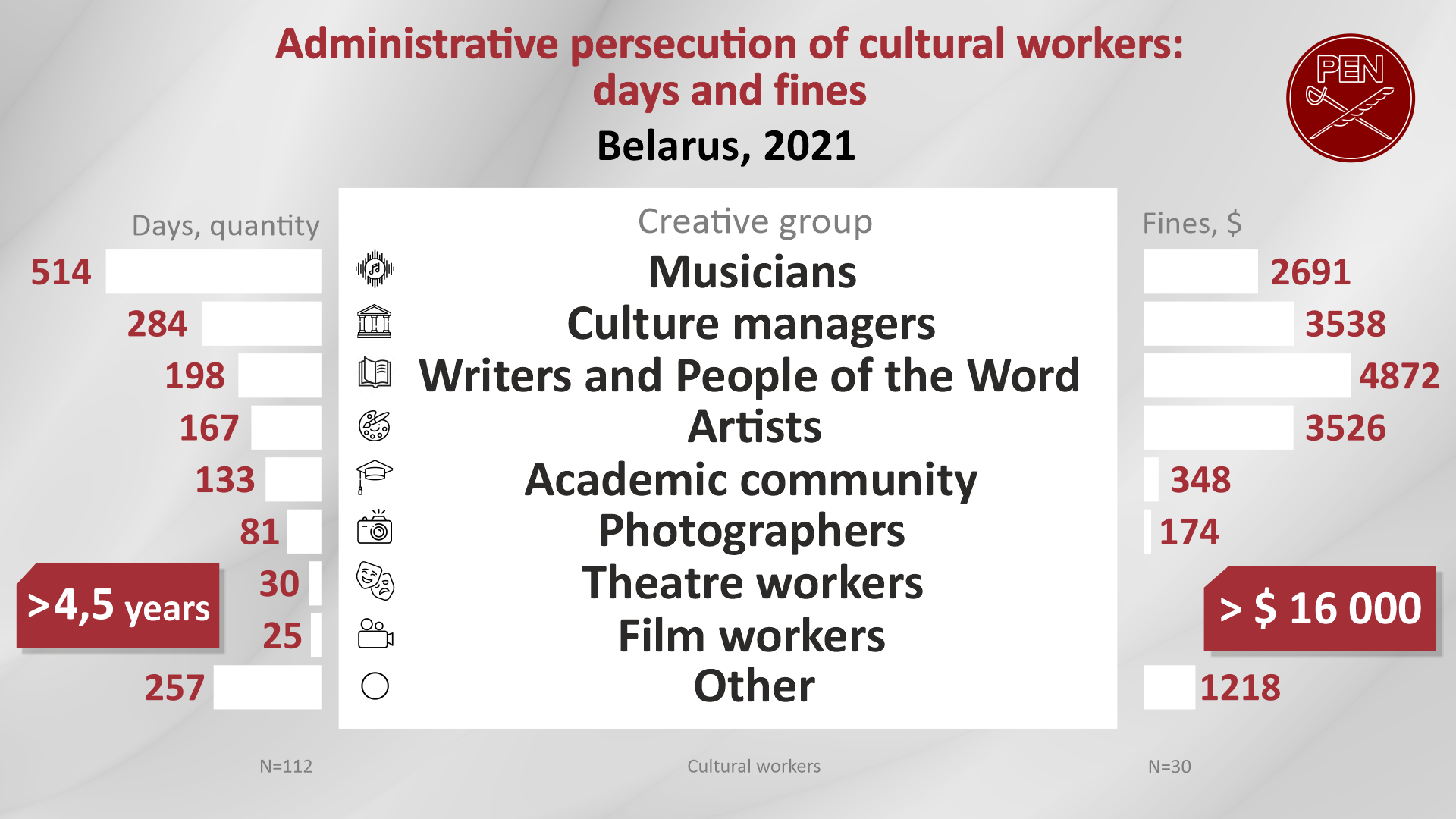
RIGHT TO LEGAL ASSISTANCE
As in 2020, we note both criminal and administrative liability cases. Lawyers have only 5 minutes to familiarize themselves with the case and to communicate with the defendant in administrative cases. Not allowing lawyers to be present during raids, detentions, interrogations, and hours-long “conversations” is common practice. We record the cases in which lawyers are unable to meet with the defendant for several days. Many of those providing legal assistance to defendants detained on political grounds have been deprived of their lawyer’s license or have been forced to cease their legal activities due to “reforms to the law on law practice” in 2021. The following individuals were deprived of their lawyers and the right to legal assistance in 2021: Viktar Babaryka, Eduard Babaryka, Ala Šarko, Pietr Slucki, Uladzimir Mackievič, Mikalaj Dziadok, Maksim Znak, Maryja Kaleśnikava, and Hienadź Mažejka.
RIGHT TO FREE EXPRESSION
The right of cultural workers to freedom of expression was violated at least 175 times. These violations took place as a result of politically motivated dismissals of cultural figures and students from cultural institutions, detentions for engaging in peaceful assembly and pickets, the expression of opinions in the media, posts or comments on social media, political inscriptions, for a piece of paper with the image of a heart attached to a window or a balcony.
III. VIOLATIONS REGARDING ORGANIZATIONS AND COMMUNITIES
Statistics on the most common types of violations regarding organizations and communities can be seen in the graph below:
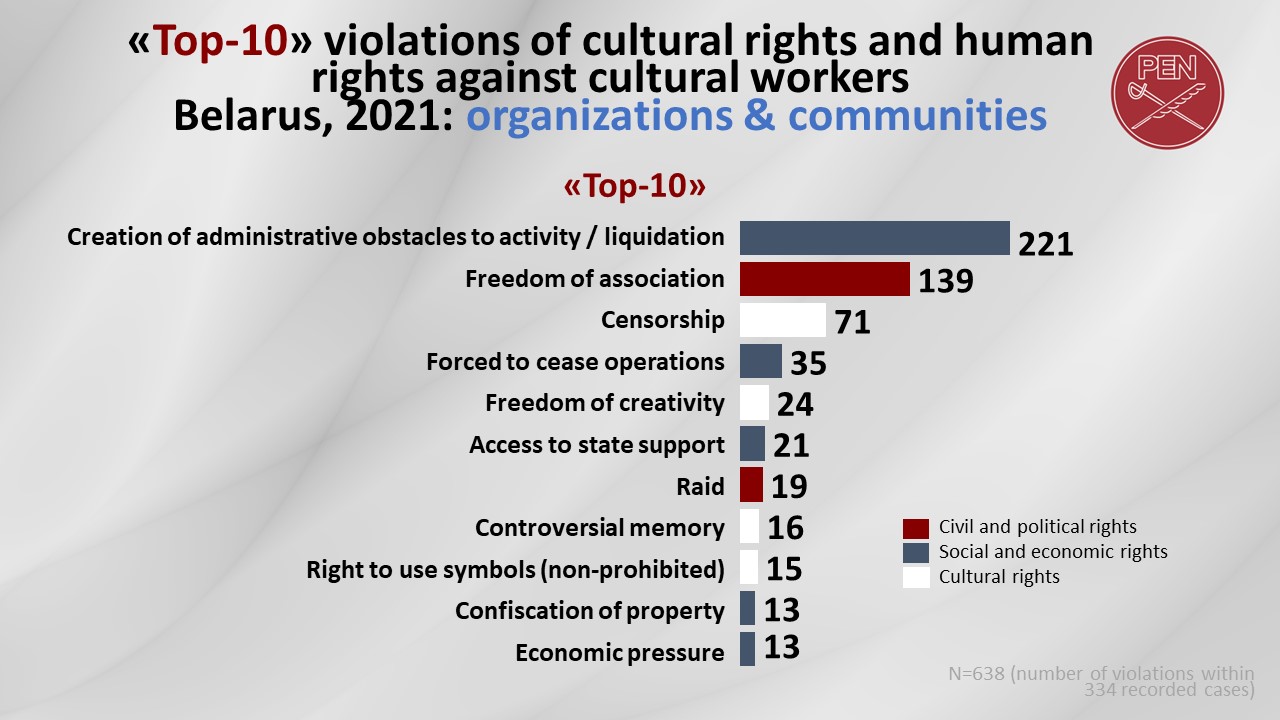
The creation of administrative obstacles to operations and the liquidation of organizations are, sadly, the most common types of violations. This type of violation was highlighted in the monitoring in 2021 period following the mass liquidation of non-governmental organizations. In 2020, there were also cases of administrative obstacles for non-governmental organizations, but the data from 2021 indicates that the authorities are now implementing their plan for destroying the non-state-controlled cultural sector.
Shops with National Symbols / Commercial Organizations
The problems of commercial organizations in the businesses selling national souvenirs, symbols and paraphernalia began in 2020 during the first wave of the protest movement and increased interest of civil society in historical symbols. The creator of the store Symbal.by Paviel Bielavus stated that “as of summer [2020], they [the authorities] have constantly been causing problems for us.” At that point, customs officials were already not allowing the sending of packages containing flags and other national symbols. We have recorded the creation of administrative obstacles to the activities of the following shops across Belarus: Prince Vitaŭt, Symbal.by, Roskvit, Moj modny kut, Vokladki, BCHB.bel, Admietnaść, Cudoŭnaja krama, Chameleon, LSTR Adzieńnie, the workshop moj rodny kut, and the Honar designer clothes brand. From the beginning of 2021, the authorities began inspections which sometimes lasted several months. Inspections, raids, and interrogations of shop owners and their premises were conducted by representatives of the Ministry of Emergency Situations, the Department of Financial investigations, the Department for Combating Economic Crimes, the Department for Combating Organized Crime, the police, the Special Branch of the Police (OMON), the Labor Inspectorate, the State Committee for Standardization, the ideology branch of the City Executive Committee, and others. We recorded the confiscation of goods, technology, documents; the termination of rent agreements, etc.
The creator of Symbal.by and cultural manager Paviel Bielavus, after being summoned by the police on November 15, was detained and sent to pre-trial detention where he remains to this day. He is accused of “participating in group activities that grossly violate public order”. On December 29, he was recognized as a political prisoner.
By the end of 20212, several shops had been forced to shut down: The Brest-based internet shop Prince Vitaŭt, the Hrodna-based Admietnaść, the Orša-based Cudoŭnaja krama, the Minsk-based Budźma-krama, and the Homieĺ-based Mroja (for economic reasons).
Space for the Implementation of Cultural Projects
Since the beginning of 2021, we have recorded the trend of creating obstacles to activities within the cultural sphere. As is the case with shops selling national symbols, many art spaces have been forced to shut down.
On January 5, a representative of the company Art Corporation received an injunction from the ministry of Emergency Situations to cease activities in the cultural space Ok16, after which all events, and the rent agreement with the owner, were canceled. At the beginning of January, the authorities shut down the art-pub Torvald – a cafe and cultural center in Viciebsk. On January 25, the founder of the space Druhi pavierch Alaksandr Karalevič was detained and interrogated. Authorities raided the space. At the end of January, the cultural space Kryly Chalopa (KCh) was forced to cease its activities. The financial police arrived at the premises and seized paper and electronic documents, after which representatives of the Ministry of Emergency Situations arrived and called the director Aksana Hajko to give explanations at the Department of Financial Investigations. The art space and bar Third place was forced to close for a period of time because the authorities demanded that the landlord cancel the rent agreement with the organization. In April, the Ministry of Emergency Situations and sanitary authorities arrived at the event space Miesca, as a result of which it was closed due to “violations”. On March 1, the platform Moving Art Factory (MAF) was forcibly closed. Its head reported the platform’s complete closure on March 16. The bar-club Hrafici collected money to pay fines for three authorities. In May, the Minsk-based art workshop 6B mastackaja majsternia closed. In October, authorities raided the Babrujsk-based art space “1387”, seized personal and professional technology equipment, items and goods from the premises and shop, and made a video. The activities of the space have been suspended since December 8. Art-Siadziba – a cultural platform that has been popularizing the Belarusian language and Belarusian culture – has been unable to continue its activities.
Mass Liquidation of Non-Profit Organizations
The third quarter of 2021 was characterized by unprecedented pressure on civil society organizations across the country. Several hundred organizations experienced inspections, raids, seizure of documents and property, freezing of accounts, calls to interrogation, discreditation via propaganda channels, blocking sites, liquidation with and without a court decision. These measures are the authorities’ response to the growing solidarity of civil society and the broader population’s protest activities as a result of the events of 2020. Mass repressions and terror continue. Officials made multiple threats against civil society in 2021. On April 10, the Minister of Foreign Affairs Uladzimir Makiej reacted to the discussion of international sanctions as follows: “Any further sanctions will lead to the destruction of the civil society that they are intended to support. I would consider this absolutely justified in this situation” (Makei on calls for sanctions). As a result of the meeting on June 29, the Secretary of Russia’s Security Council Nikolai Patrushev supported Alyaksandar Lukashenka’s claim that outside forces were trying to overthrow him, and that the aim of non-profit organizations was to “overthrow the regime and the authorities” (Patrushev on the “external threat”).
Between July 14–17, many raids against non-governmental organizations, parties, rights defenders, and independent experts were conducted. On July 22, a day before the mass liquidation of non-profit organizations, at a meeting with the Council of Ministers, Lukashenka stated that in Belarus “there are about 2,000 NGOs, thugs and foreign agents. So what? Have you gotten your democracy? Now, everyone finally looked around and realized that it’s harmful for the state. We are conducting a sweep. Do you think it’s easy? There are already thousands of people working there, our people, mostly brainwashed, with twisted brains sponsored by foreign money“ (Lukashenka at the meeting with the Council of Ministers). On July 30, at a meeting with local authorities, Lukashenka stated that “185 destructive structures representing a threat to national security, including the representatives of foreign non-profit organizations, 71 national and local non-governmental associations, 113 institutions” (Lukashenka at the meeting with local authorities). In an interview with the BBC on November 19, responding to the correspondent’s question about the mass liquidation of civil society, Lukashenka stated that “we will destroy all the bastards that you are funding” (Lukashenka at the BBC interview). On December 16, at a meeting on counteracting sanctions, Lukashenka once again stated that “traitors will never be forgiven… Those organizations financed from abroad and who organized a coup d’etat and mutiny, we have liquidated all of them” (Lukashenka dotted the question of NGOs in Belarus). On December 21, with the aim of “defending the sovereignty and independence of Belarus”, deputies adopted – on the second reading – a law which makes participation in liquidated organizations a crime (Law “On Changing the Criminal Code”).
There are currently 309 organizations in the list of NGOs currently in the process of forced liquidation as of 12.31.2021 (Liquidations and suspensions of activities of civil society organizations in 2021). Their activities range from sports and beekeeping to education and rights defending.
As with commercial shops selling historical symbols, targeted pressure on the non-commercial sector began in the autumn of 2020: criminal cases were launched based on foreign funding, and the raids of offices and employees. At that time, however, it was mainly human rights organizations that were experiencing this pressure. From May 2021, the Ministry of Justice began mass unplanned inspections of all types of non-profit organizations. The first organizations to experience such inspections were: PEN Belarus, the Belarusian Committee of the International Council on Monuments and Places, Association of Belarusians of the World “Fatherland”, the Union of Belarusian Writers, and other organizations. All had to provide an unprecedented quantity of information and documents in an extremely short period of time.
We recorded the first liquidation of a cultural non-commercial organization in April 2021. On April 19, the Brest Economic Court decided to liquidate the NGO Polish School in order to “defend the interests of the State and Society” against the backdrop of a propaganda campaign against the Polish ethnic minority. In May, the Hrodna-based cultural-educational institution Center for City Life was liquidated due to an exhibition of the work by Aleś Puškin, in which there was supposedly a painting that violated anti-extremism laws. In June, the Brest-based socio-cultural institution Kryly Chalopa Theater and the cultural-educational organization Soil of the Future were liquidated. At the beginning of July, the Brest-based regional development agency Dziedzič – which organizes cultural festivals and other activities – was liquidated. After the “purges” of non-profit organizations between 14–17 June 2021 – as well as mass raids of offices and detentions of employees – the liquidations of non-governmental organizations began in earnest. Institutions, due to their legal formation, were liquidated in a simplified process, and almost no one from these institutions received written notification of the liquidation or its justification. They often only found out by reviewing the Unified State Register. Organizations liquidated in July include: Mova Nanova (New Language) – an organization promoting the Belarusian language and Belarusian culture; Unovis Forum – a historical-cultural heritage institution; Hrodna Rock Club – an organization founded by the musician Ihar Bancar; The Nil Hilevič University and many other significant cultural organizations were also liquidated, including:
- PEN Belarus: a social organization created by well-known writers in 1989, and member of the international PEN club. It was liquidated on August 9 by the Supreme Court.
- Art Corporation: Organizer of the international film festival Listapad and the theater art forum “Teart”. It was liquidated on August 25.
- Belarusian Committee of the International Council on Monuments and Places. It was liquidated on September 15.
- Talaka: Homieĺ-based folklore organization, reviving ancient Belarusian rites and the collection of folklore. It was liquidated on September 15.
- Belarusian School’s Society: Liquidated on September 24.
- Association of Belarusians of the World “Baćkaŭščyna” (Fatherland): Liquidated on September 24.
- Union of Belarusian Writers: A social organization founded in 1934. It was liquidated on October 1 by the Supreme Court.
- Francišak Skaryna Belarusian Language Partnership: One of the oldest social organizations in Belarus. It was liquidated on November 8.
One of the most common justifications for liquidation is that “the organization’s activities do not correspond with its charter”, but no one knows in exactly what way they do not correspond. Judging by the words of the Minister of Justice on the STV TV channel on December 5, these organizations were closed because they “undermined the foundations of State authority (New Minister of Justice about NGOs).
As of December 31, 2021, at least 98 non-commercial organizations had experienced the creation of administrative obstacles to operation. We have not seen a single instance in which the court has defended the interests of a non-commercial organization. The courts unquestioningly comply with demands from the Ministry of Justice (and regional justice departments) for the liquidation of such organizations.
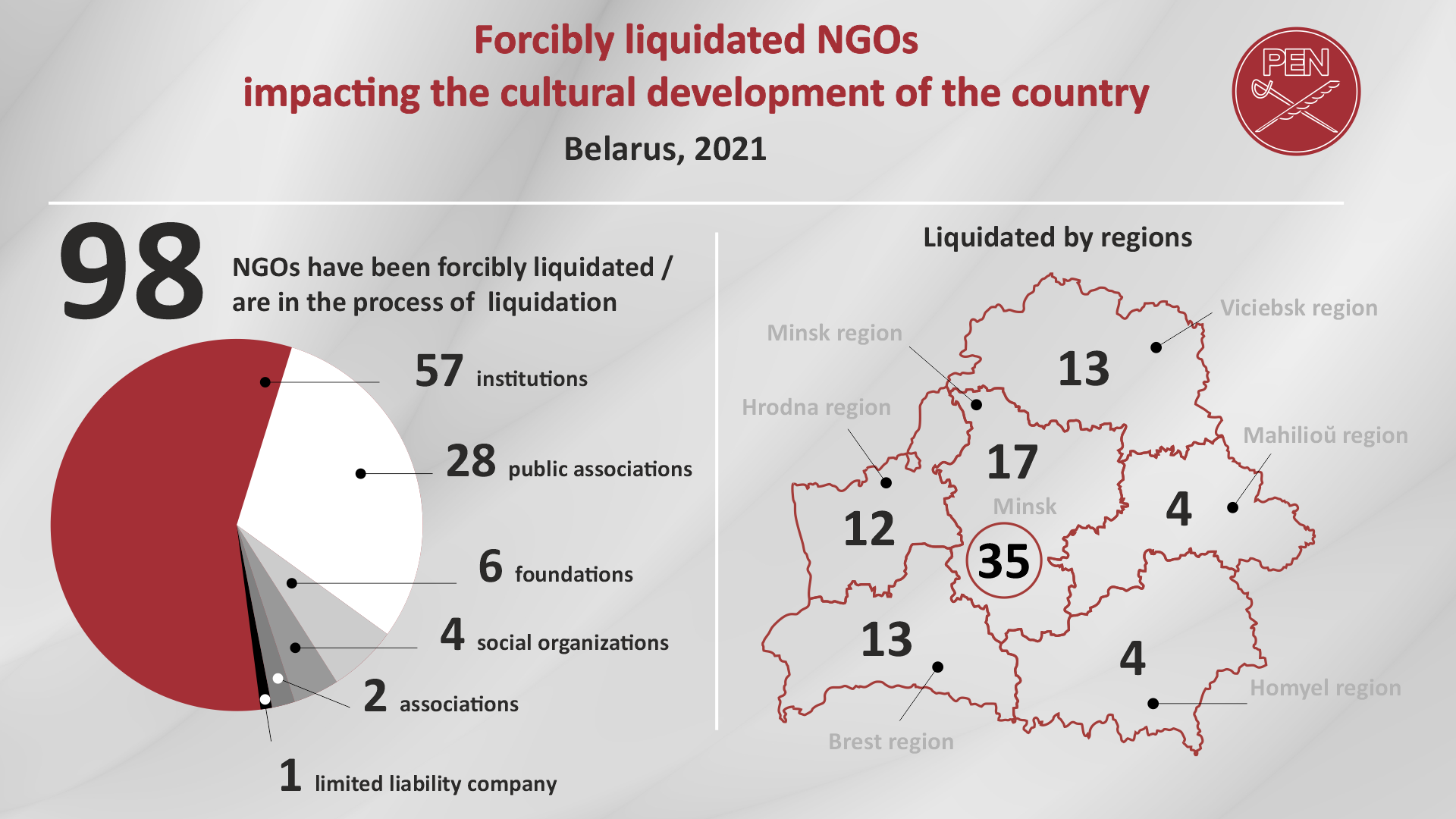
It is also important to note the growing number of non-commercial organizations deciding themselves to cease their operations. While this report only records forced liquidations, we are also witnessing requests by the founders of organizations for the liquidation of their organizations due to the unfavorable socio-political situation and/or pressure from the authorities. In total, the Lawtrend list includes 175 organizations that have decided to self-liquidate in 2021 (Decisions to self-liquidate made by non-commercial organizations). About 40 of them we refer to the sphere of culture.
Among the organizations and spaces not mentioned above but also forced to cease their activities in 2021 were the Goethe Institute and the German Academic Exchange Service (DAAD). These are the world’s premier organizations for the study of German language and culture. The Belarusian authorities also put pressure on the American center in Belarus – which facilitated educational trips to the United States and allowed participants to learn the best and most innovative practices on a variety of topics, including environmental protection and the preservation of cultural heritage. On December 20, 2021, the USAID office in Belarus was closed.
After a raid on the editorial office, the TUT.BY Gallery – acquainting visitors with modern Belarusian art – was closed. The Contemporary Artistic Theater was forced to emigrate from Belarus. The troupe of the Free Theater ceased its activities on July 1 and have not planned any further performances in Belarus. The theater laboratory “Fortinbras” – part of the Belarus Free Theater – was forced to suspend its activities. The musical club “Berlin” closed on October 14.
We will mention the forced closure of print publications in the next section.
IV. CULTURAL RIGHTS
CENSORSHIP AND CREATIVE FREEDOM
In 2021, we recorded 198 instances of censorship and 94 instances of the violation of the right to creative freedom.
The following musicians and artists were not allowed to receive necessary certificates for their concert performances: Krama, Kasta, J:MORS, RSP, Daj Darohu!, Znich, Rita Dakota, and others. The Contemporary Artistic Theater was not allowed to stage “Former Son”, a performance based on the novel by Saša Filipienka. The authorities also did not grant permission for the performance of a play based on Uladzimir Niaklajeŭ’s drama “Jahajla” near Kreva Castle. Theatre Ch could not find a venue in which to stage its iconic play “Dziady”. The authors of the dance show “Inner and Outer Space” were denied a concert certificate.
The following exhibitions were censored or closed:
- Maksim Saryčaŭ’s “I can almost hear the birds”.
- “The machine is breathing but I am not”, organized by Natalla Trenina and Taćciana Hacura-Javorskaja.
- “Together” exhibition of the creative association “Pahonia”.
- Aleś Maračkin’s personal watercolor exhibition “Akva/areli”.
- Nadzia Buka’s “Personal Business”.
- Viktar Barysienka’s photo exhibition “Time Itself Remembers”.
- Viktoryja Balcar’s “Dance Theater in the Theater”.
- Maryna Baciukova’s “Sula. Intact.”
In Grodno, authorities canceled the performance of “Kadyš” and a meeting of the actors; in Minsk, the play “Čarnobyl Prayer” based on the work by Svialana Aleksijevič was – without explanation – replaced with another. It then completely disappeared from the repertoire of the Republican Theater of Belarusian Drama; the Homocosmos Theatre’s play “White Rabbit, Red Rabbit” was canceled multiple times; Immediately after the premier of the play “Tyl” in the Jakub Kolas Theater in Viciebsk, the poster promoting it was removed from the billboards.
The Belarusian organizers repeatedly asked the band Kino not to play the song “Changes!” during their concert. After a statement by a “not indifferent” citizen two concerts in memory of Holocaust victims – “Yellow Stars” – were canceled in the Minsk Philharmonic. In 2021, a traditional international festival of spiritual music “Mighty God” – which has taken place every other year since 1993 – was meant to take place in Mahilioŭ but was canceled. The organizers did not comment on the reasons behind the cancellation; however, the authorities had been strongly opposed to the prayer of the same name since the festival’s previous iteration (Lukashenka’s speech: Look, you risk to run into trouble). Due to his previously expressed political views, the Russian author Aleksandr Tsypkin was not allowed to perform his project “Unprincipled Readings”. Musicians performing songs in the metro as part of the social project “Pedestrian” were detained. Due to observation by the security services, the satirical group “Aristocratic Paleness” suspended their activities.
At the demand of Belarus Film, the much-anticipated film “Kupala” was pulled from the Eurasian Film Festival in London. The Belarusian premier of the film also did not take place in 2019 and, after the events of August 2020, it was “put on the shelf” (it featured a scene showing the shooting of peaceful protesters); all video materials related to the film were either blocked or disappeared from social networks. In November, Belarusian viewers could not watch the film “Temptation” – about the love between two nuns – by the director Pol Verkhoven. It had initially received a tour certificate, but later disappeared from billboards due to supposedly “unethical scenes of a sexual nature and sexual perversion”. Alaksandr Anisimaŭ’s film “The Adventures of Pranciš Vyrvič” featuring former actors from the Kupalovkij Theater was banned from being screened.
Works by Sviatlana Aleksijevič, Aleksandr Solzhenitsyn, and Vladimir Nabokov have been banned from the 11th class literature syllabus: Aleksijevič, from the “Prose – Humans and War” section, and Solzhenitsyn and Nabokov from “Dissident Literature”.
LITERATURE
The pressure on independent publishing houses, individual publishers, booksellers, and press, authors, and even readers began in January 2021.
Publishing houses. In January, Hienadź Viniarski and Andrej Januškievič – directors of independent Belarusian language publishers – were detained and interrogated. The offices of Januškievič and Knihazbor were raided, and property – including computers, telephones, and books – was confiscated. The accounts of these organizations – as well as that of the online shop knihi.by, were frozen and remained so for 146 days, almost 5 months. They still had not been unblocked by June 8. During this time, the activities of these publishers were all but paralyzed and the organizations found themselves under the threat of closure, since it was not possible to pay for typographers, resources for new books, and recoup losses.
Without the right to distribute. Belarusian customs authorities have been stopping the distribution of books by certain authors and from certain publishers. The novel “Revolution” by Viktar Marcinovič was withdrawn from circulation. The book entitled “The Belarusian National Idea” by Zmicier Lukašuk and Maksim Harunoŭwas not delivered to foreign buyers. The republished novel “The Dogs of Europe” by Alhierd Bacharevič – printed by the publisher Januškievič in Lithuania – was seized by customs officials on the grounds of supposed extremist content. To this day, the publisher has not been able to distribute the work.
On January 29, 2021, an expert commission in Minsk concluded that the book “Belarusian Donbas” by Kaciaryna Andrejeva (Bachvałava) and Ihar Iljaš in contained extremist content. They did not specify the exact parts of the book that contained such content. On March 26, a court upheld the “extremist” designation, and the subsequent appeal by the authors was denied. The journalist Raman Vasiukovič, who had imported two copies of the book into Belarus before it had been deemed “extremist”, was fined approximately 220 USD.
On March 4, this same commission concluded that the book “The Belarusian National Idea” – comprising 85 conversations with various people on the Euroradio channel – contained extremist content. The text of the conclusion was identical to that regarding “Belarusian Donbas”. Information about the court that deemed the book “The Belarusian National Idea” as “extremist” has not been made public. An administrative case was launched against Minsk resident Jahor Staravojtaŭ for possession of the book, bought in a State bookshop and withdrawn before the “extremist” designation. The court only dropped the case against Staravojtaŭ because of the expiry of the administrative liability period (2 months).
In February, pensioners were detained and punished for reading books by Belarusian classics on the train – “opposition literature,” according to the police.
The ideological concept of “protest literature” was introduced – as both state media and law enforcement agencies refer to Belarusian classics and contemporary literature. Marcinovič’s “Revolution” and Uladzimir Arloŭ’s books are mentioned most often. We recorded instances of the discreditation of writers and historians by State media and pro-regime Telegram-channels.
Distribution of literature within the country. The administration of Bielkniha – the largest bookseller in Belarus – gradually removed from their shelves, and ceased the distribution of, books by Alhierd Bacharevič, Viktar Kaźko, Uladzimir Niaklajeŭ, Viktor Marcinovič, Barysa Piatrovič, and many other authors. Public libraries have removed works by these and other authors. At the beginning of the year, the business Bielsajuzdruk unilaterally terminated certain print publications, including the cultural publications Novy čas and Naša historyja. In April, one of the biggest State book sellers Akademkniha refused to sell the magazine Naša historyja. Immediately after this, the Belarusian postal service terminated a contract with these publishers, starting from July 2021 one already couldn’t subscribe to them. Since July, the weekly paper Novy čas has been unable to secure the services of private typographers. There have also been a number of difficulties regarding the distribution of this year’s Naša historyja calendar.
Books under arrest. During a raid on the Nil Hilevič university, many books were confiscated from the library. Authorities removed the entire contents of the library from the Orša office of Francišak Skaryna Belarusian Language Society. Books from the series “Belarusian Prison Literature” were confiscated despite attempts by the editor Alena Lapcionak to save them. There have been many instances of the confiscation of books during raids on the property of activists. For example, authorities have already confiscated books twice from the Viciebsk opposition activist and book distributor Barys Chamajda. In December they confiscated 12 of his Belarusian books, which had been officially published in Belarus.
In 2021, the authorities prevented the publication of significant print media. The 2022 subscriber catalog of the Belarusian postal service did not list the magazine Vožyk which marks, this year, its 80th anniversary. It is the country’s only satirical Belarusian language magazine, and has engaged many authors of Belarusian classics and artists. In connection with the liquidation of the founder of the publication Francišak Skaryna Belarusian Language Society, the authorities prevented the publication of the literary journal Vierasień in November. For the last 12 years, it has become an important fixture in the country’s cultural life. On December 29 in Lida, the last edition of the paper Naša slova was published. It had been running since March, 1990. The editor Stanislaŭ Sudnik noted that, on January 5, 2022, an online publication called Naša slova would be launched, but that it would not be the same as the original publication. The Minsk magazine where Minsk – which had covered the capital’s cultural life for 15 years – has shut down due to the economic situation in the country.

CONSUMERS OF CULTURAL PRODUCTS
In 2021, we noted instances in which law enforcement agencies paid particular attention to tour guides and participants in historical excursions. Detentions, or police convoys accompanying such excursions, took place in Polack, Navahrudak, and Minsk. In February, at the holiday resort Spark, near Smaliavičy, at a concert of Belarusian groups Raźbitaje serca pacana, Panska Mos and Ok-Band, performers and audience members were detained. 68 people – including minors – were arrested in total. 59 of these individuals were later transferred to prison cells in Žodzina. In March, police arrived at the free Belarusian language classes given by Mova Nanova in Vaŭkavýsk on the same evening on which the group Krama was meant to perform. In total, 35 people were detained including both students and teachers. The regional branch of the Ministry of Internal affairs detained them for around 40 minutes and took some of their fingerprints. On June 8, police detained 8 people at a joint viewing of the play “White Rabbit, Red Rabbit” at the cultural center “Red Palace” in Minsk. The majority were punished with 15 days of administrative arrest. 3 people were detained in September near Orša during rehearsals for a performance as part of the annual festival “Orša Battle ” – they were punished with 10 days of arrest or fines. In November in Orša, police arrived at a celebration of the birthday of the author of Belarusian classics, Uladzimir Karatkievich. Fans gathered in the park Fairytale Country with flowers and read the author’s works. The police said this was an unsanctioned event and recorded the passport information of all the participants.
V. STATE POLICY IN THE CULTURAL SPHERE
In the middle of December 2021, the Belarusian Helsinki Committee published a report on the state of human rights in Belarus in 2020 (Belarus National Human Rights Index, 2020), in which the right to participate in cultural life was evaluated based on 4 components, receiving an average score of 2.8 on a 10-point scale. Although the index was created based on data from 2020, the mass repressions of cultural workers and State interference in the country’s cultural life have only increased in their severity in 2021.
Even before the crisis, state support for the cultural sphere was selective – independent cultural actors received practically no subsidies or preferences from State cultural institutions. This financial situation has not changed. The State has succeeded in its campaign of censorship and repression and, in 2021, also began to exert pressure on State cultural institutions.
State ensembles and orchestras continued to operate as normal throughout 2021 without any Covid restrictions for event attendees. The “Slavianski Bazaar” – a favorite of the authorities – took place without Covid restrictions. Many of the previously advertised artists refused to participate in the festival due to the political situation and requests from citizens not to support the totalitarian regime with their performances. For the first time, the festival – which, in previous years, was considered an unmissable event – did not generate much “buzz” and places had to be filled by distributing tickets through state-owned companies.
For the first time since 2004, Belarus did not participate in the Eurovision Song Contest due to its disqualification after violating contest rules and providing the performer with an overly political song. In response, the Belarusian state TV and Radio corporation – the organizer of the national Eurovision selection process – refused to broadcast the contest. Belarus also did not participate in the children’s version of Eurovision.
Without the participation of passionate and engaged specialists and independent experts, the State has not been able to produce high quality events. The current National Theater Award – which, even before, was far from ideal – became the “apotheosis of State policy towards the theater” (© Dzianis Marcinovič). The quality of the film festival “Listapad” also significantly declined, and was deprived of its accreditation in the International Federation of Film Producers (FIAPF).
Staffing Policy and Dissent
At the end of September 2021, we recorded 64 cases of illegal dismissals. These occurred either as the termination of a contract, or the forcing of an employee to write a resignation letter stating that they were doing so “of their own free will”. Beginning in October, a list of “undesirable persons” to be dismissed from cultural institutions became public. Dismissals due to dissent characterized the final months of 2021. Theater agents entrepreneurs, museum workers, library workers, philharmonic musicians, and many more, were dismissed. The National Historical Museum in Minsk, the Academy of Arts, the National Library, and many other State cultural institutions, underwent “staffing reviews”. The Minister of Culture Anatol Markievič shed light on the true scale of this phenomenon, stating that more than 300 people had been dismissed for their “destructive positions”. He made this statement during a speech in Stoŭbcy on January 20, 2022 (Markevich on staffing) (Note: the minister’s words were removed from the media the next day). By the end of December, we had collected data on 123 dismissals of cultural workers from no less than 30 cultural institutions during 2021 either through public sources or personal communication with the individuals in question. We expect further details on these kinds of dismissals to emerge in the first half of 2022.
One of the reasons why people are reluctant to make the pressure they have experienced public is the hope of getting a job in another cultural institution in Belarus. However, an analysis of changing employment requirements demonstrates that, in many cases, there is a de facto ban on the profession in any cultural institution in the country. “Recommendation” letters advising employers not to hire certain individuals have been sent to recruitment agencies. We will understand more about how this works in practice in 2022.
In his speech, the Minister of Culture also referred to the “optimization” of 1,611 staff units. As a result of this “optimization”, the Ethnology & Folklore faculty of the Belarus State Art & Culture University was dissolved after 20 years of existence.
After a spate of dismissals from the autumn of 2020, in 2021 new appointments began – of directors, artistic directors, producers; the selection of new acting troupes. New vacancies regularly open in the Janka Kupala National Theater. Since its “dispersal” after the 2020 election, in 2021 there have been 5 auditions, to which actors who are “talented and eager to work” between the ages of 21 and 65 were invited. We also recorded new appointments in education institutions in the cultural sphere where employees and directors had previously been dismissed. Museums also witnessed new appointments in 2021: in February, the Great Patriotic War Musem’s Head of Security became the new director of the State Museum of Belarusian Literary History.
VI. INSTEAD OF CONCLUSIONS: OPPRESSIVE TRENDS
- Increase in the number of political prisoners since the first arrests in the summer–autumn of 2020. As of 12.31.2021, there were 969 political prisoners in Belarus. 68 of them are cultural workers.
- The criminalization of dissent: the increase in the number of criminal cases based on absurd accusations, the introduction of criminal responsibility for organizing or participating in the activities of a public association that has been liquidated.
- Expansion of “extremism” laws and the clampdown on peaceful forms of freedom of expression.
- Propaganda and hate speech are the languages of State media. The targeted campaign of discreditation of Belarusian cultural workers.
- The state sees creative freedom as a threat and seeks to suppress it through censorship and self-censorship. Self-censorship is a means of surviving in the conditions of the socio-political crisis.
- The polarization of society into “us” and “them”, which creates the conditions for discrimination and poses a threat to cultural diversity.
Additions.
In 2022, we will publish documents on the state of cultural heritage, the Belarusian language, contested historical memory, the fight against the historical white-red-white symbology.
We now have … an extremist theater, an extremist culture,
we are extremists ourselves, and our whole life is extremist
(© Dzianis Martinovich, theater critic)
METHODOLOGY. Basic concepts and comments
Cases of violations of the cultural and human rights of cultural workers – circumstances leading to the violation of one or more of the rights of cultural workers, organizations, communities, or participants of cultural processes.
Violation – a type of violation within the following categories: cultural rights, civil and political rights, social and economic rights.
People of word – writers, translators, literary researchers, political analysts, and intellectuals. The group “Writers and people of word” is paramount in the context of attributing a cultural figure to one or another creative group. The monitoring does not include journalists and bloggers, although these are also a target group of the International PEN Center.
Data from public sources is collected on a daily basis. The information obtained through personal communications with cultural workers and direct appeals to PEN Belarus is recorded as it comes from these sources. The quantity of cases per quarter reflects the events that took place during the reporting period, as well as those that took place before but which were recorded during this period (about 10 %).
